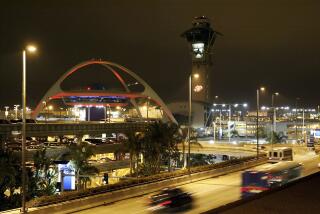‘Unconscious’ Flier Moved Head, Tracking Pilots Say
- Share via
WASHINGTON — Military pilots who tracked Washington lawyer Thomas Root’s plane during its bizarre six-hour flight last Thursday saw Root turn his head several times, which could cast doubt on his statements that he was unconscious during most of the flight, federal investigators announced Wednesday.
“Various pilots reported that, as he was intercepted from the right, his head would turn to the right, and, as he was intercepted from the left, his head would move to the left,” National Transportation Safety Board official Andrew Alston said. “The sun visor moved position at least three times during the flight.”
In addition, Alston said, a toxicology report showed no sign of elevated levels of carbon monoxide in Root’s blood, virtually ruling out an earlier theory that he had lost consciousness from carbon monoxide poisoning. And aviation experts have discounted the theory that he may have suffered oxygen deprivation at the altitude he was flying, 10,000 feet.
Investigators confronted Root Wednesday morning with the conflicts between his statements and the evidence, Alston said, but Root offered no explanation.
Root’s strange flight focused attention on his business dealings with a Georgia firm, Sonrise Management Services Inc., which recruited investors for FM radio license applications. Root represented the applicants before the Federal Communications Commission.
Few of the applications were successful, and the firm’s operations are now under investigation by state and federal regulatory officials.
Wednesday, Sonrise shifted blame to Root, filing suit in federal District Court here charging that Root had violated his contract with Sonrise to represent investors and had improperly handled client funds placed in his law firm’s escrow account. The suit seeks nearly $600,000 in damages.
$15 Million Invested
Investors have placed $15 million or more into the partnerships that the company organized to seek radio station licenses. To date, efforts by FCC officials to obtain information about those dealings have largely been unsuccessful.
Root’s plane went off course Thursday when he was flying from Washington to Rocky Mount, N.C., for a legal proceeding. Military pilots who tracked the flight watched the plane for hours as it flew south, with Root slumped back in his seat, until the plane apparently ran out of fuel and plunged into the ocean 14 miles from the Bahamian Island of Eleuthera.
As the plane sank, rescuers were stunned to see Root swim away from the wreckage. The oddity of the flight deepened when it was discovered at a Hollywood, Fla., hospital to which Root had been taken for treatment that he had suffered a gunshot wound in the abdomen.
Police officials said that the gunshot appeared to be self-inflicted, a suggestion that Root and his relatives have strenuously denied.
Accidental Firing Discounted
Spokesmen for Smith & Wesson Corp., which manufactured the revolver that Root was carrying in his plane, have denied that the impact of the plane’s hitting the water could have caused the gun to fire, as Root’s relatives have suggested.
“Any suggestion that our revolver will fire without trigger contact is absolutely false,” Smith & Wesson Vice President Dick Backman said Wednesday. The gun “can be dropped on concrete” and will not go off unless someone pulls the trigger, Backman said.
No Safety Issues Found
With no plans to retrieve the sunken plane and weapon, the mystery of Root’s flight may not be solved. The NTSB “has not identified any aviation safety issues” in Root’s flight, a spokeswoman said Wednesday, and is hoping to “wind down” its safety investigation.
The FBI will continue to investigate the flight to see if any federal laws were broken, but, so far, little evidence of that has emerged. Wednesday, a spokesman for William J. Bennett, director of the White House Office of Drug Control Policy, denied reports that a federal drug task force had been investigating Root.
Laboratory reports on whether Root had drugs or alcohol in his system are likely to be released later this week or early next week, the NTSB said.
More to Read
Inside the business of entertainment
The Wide Shot brings you news, analysis and insights on everything from streaming wars to production — and what it all means for the future.
You may occasionally receive promotional content from the Los Angeles Times.











